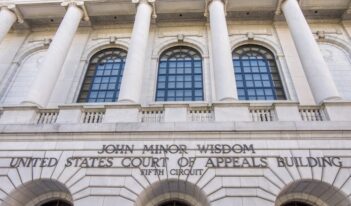
The U.S. Supreme Court preserves access to mifepristone, the Biden Administration removes medical debt from credit reports, and more…
IN THE NEWS
- The U.S. Supreme Court ruled that an anti-abortion medical organization lacked standing to challenge the Food and Drug Administration’s (FDA) approval of mifepristone, a medication used to terminate pregnancies. In a unanimous decision, the Court determined that the plaintiffs who opposed the FDA approval of the drug were not personally harmed by the FDA’s policies because none of the plaintiffs had ever prescribed or used the drug. Although the Court did not evaluate the FDA’s approval of mifepristone, the ruling preserves access to a medication that “was used in nearly two-thirds of all abortions in the U.S. last year.”
- The U.S. Supreme Court ruled in favor of Starbucks’ challenge to a judicial order to rehire seven employees that sought to unionize while the company’s case against the National Labor Relations Board (NLRB) proceeds. The Court ruled that the lower court issued a preliminary injunction improperly because it did not apply a stringent four-part test like other courts have used to assess similar disputes. This decision comes as more than 10,000 Starbucks employees across the country have unionized, and as President Joe Biden continues to back the NLRB’s action against Starbucks.
- The Consumer Financial Protection Bureau (CFPB) proposed a rule that would remove past and future medical debt from credit reports to increase credit scores and loan approvals. A recent CFPB report revealed that 15 million Americans—many of whom live in poor southern communities—have medical debt on their credit reports, making it more difficult for them to obtain car, home, and small business loans. Vice President Kamala Harris stated that the government intends for the proposed rule to address this reality, commenting that “no one should be denied access to economic opportunity simply because they experienced a medical emergency.”
- A federal judge in the U.S. District Court for the Northern District of Florida ruled that key parts of Florida’s ban on gender-affirming care for minors are unconstitutional. The 2023 state statute prohibited individuals under the age of 18 from obtaining hormone therapy or puberty blockers to treat gender dysphoria and placed restrictions on gender-affirming health care for adults and children already receiving treatment. Because the law permitted health care providers to continue prescribing puberty blockers and hormone therapy to cis-gendered patients, the judge determined the ban and restrictions for transgender individuals unconstitutionally discriminated on the basis of sex. The judge cited public statements made by Florida legislators and Florida Governor Ron Desantis that expressed “outright disapproval” of transgender people, concluding that “anti-transgender animus motivated bill sponsors and at least a significant number of legislators.”
- Judge Daniel D. Crabtree of the U.S. District Court for the District of Kansas ruled that only three of the 11 states challenging a Biden Administration student loan forgiveness program have legal standing to proceed with the case. The Saving on a Valuable Education (SAVE) Plan reduces monthly payments for eligible borrowers’ income-based repayment plans and provides debt forgiveness after 10 years for those with principal balances less than $12,000. Judge Crabtree held that South Carolina, Texas, and Alaska “just barely” showed that the SAVE Plan may reduce revenue for government-owned student loan servicers. Judge Crabtree rejected eight other states’ arguments that the SAVE Plan would decrease income tax revenues and inhibit state employee recruitment, explaining that states are not required to change tax codes and claims about recruitment are irrelevant.
- The U.S. Court of Appeals for the Ninth Circuit upheld a California law that could compel app-based transportation and delivery service companies to classify workers as “employees” rather than “independent contractors.” The law does not explicitly classify particular workers, but instead imposes tests to determine workers’ status. If applied, these tests would label app-based workers in the transportation and delivery service industry as employees, while classifying other app-based workers as independent contractors. Many “gig economy” companies categorize service providers as contractors to cut costs because employees are legally entitled to many benefits and protections that contractors are not. The Ninth Circuit’s decision comes as the California Supreme Court prepares to rule on the constitutionality of Proposition 22, a 2020 state ballot measure that exempts app-based driver and service companies from classifying workers as employees.
- The U.S. Environmental Protection Agency (EPA) proposed new rules for chemical substances subject to premanufacture notices under the Toxic Substances Control Act (TSCA). The proposed rules would require persons preparing to manufacture or process certain chemical substances to notify EPA at least 90 days prior to beginning such activity if the activity is proposed as a “significant new use,” which are uses of toxic chemicals that EPA considers potentially concerning. There are no set standards of what qualifies as a significant new use under the TSCA, but EPA has authority to consider “all relevant factors,” including projected volume of the action and the extent to which the activity increases human exposure to a chemical substance. EPA expects the rules to assist the agency in identifying significant new uses and evaluating a chemical’s risk before manufacturing or processing begins.
- The Federal Energy Regulatory Commission (FERC) granted final approval to Equitrans Midstream Corporation to start operations on the controversial Mountain Valley Pipeline, a 303 mile pipeline that will carry natural gas from northwestern West Virginia to southern Virginia. Last year, President Joe Biden announced a deal with House Republican leaders approving the pipeline after over six years. The cost of the long-awaited pipeline is now estimated to be $7.85 billion. Environmental groups decried the pipeline approval, especially after just last month a part of the pipe burst during integrity testing.
WHAT WE’RE READING THIS WEEK
- In a recent National Bureau of Economic Research working paper, Diane Whitmore Schanzenbach, a professor of Human Development and Social Policy at Northwestern University, and Michael R. Strain, a Director of Economic Policy Studies at American Enterprise Institute, analyzed shifts in labor following the 2021 Child Tax Credit (CTC) expansion. The CTC—a tax break for caregivers who have qualifying dependents and earn below a particular income threshold—expanded with increased benefits for low-income families. Schanzenbach and Strain noted that economic theory suggests that this expansion should have decreased the labor supply among recipient families. They found that employment among “mothers with relatively low levels of education” declined but employment levels did not decrease in more broadly categorized demographic groups. Schanzenbach and Strain concluded that theory and actual data align best when research focuses on the demographic group likeliest to be affected by a given policy.
- In an essay in the Yale Journal of Regulation, Dena Adler and Max Sarinsky, from the Institute for Policy Integrity at the New York University School of Law, discussed alternatives to the Chevron doctrine, which is a framework that currently mandates that courts defer to reasonable agency interpretations of ambiguous statutes. Adler and Sarinsky considered alternatives that would support agencies adopting ambitious rules in light of concerns about the loss of agency power in a post-Chevron world. They emphasized that doctrines of best statutory reading, statutory discretion, and fact-bound judgments, all which relate to assuming that statutes are meant to be interpreted by agencies using facts they find, may curtail negative impacts on ambitious rulemaking due to Chevron being eliminated or curtailed. Adler and Sarinsky argued that curtailing Chevron may in fact support ambitious rulemaking in instances where the best statutory reading doctrine requires agencies to establish new regulations based on such readings. Furthermore, Adler and Sarinsky emphasized that the arbitrary and capricious test will still obligate courts to respect agency factual findings, which can undergird ambitious or controversial agency decisions and policy choices.
- In an essay in the UC Davis Law Review, Eushrah Hossain, a legal fellow at the Public Rights Project, Valencia Scott, a paralegal at the Public Rights Project, and Joshua Rosenthal, legal director of the Public Rights Project, analyzed public comments submitted to the Federal Trade Commission (FTC) in response to the FTC’s 2023 proposed ban on non-compete agreements and considered how this data can inform policy-making for state and local governments. While noting the significance of the FTC’s ban on non-competes, Hossain, Scott, and Rosenthal argued for the necessity of public enforcement at the state and local level, particularly in jurisdictions where such agreements were unenforceable yet still prevalent before the ban. They also advocated the importance of using existing laws beyond traditional labor regulations, including antitrust and consumer protection laws, to address and mitigate the effects of noncompete clauses on worker mobility and power.
EDITOR’S CHOICE
- In an essay in The Regulatory Review, Scott Skinner-Thompson, a professor at University of Colorado Law School, argued against state laws prohibiting transgender youth from using bathrooms, playing on sports teams, and seeking medical care in affirmation of their gender identities. Skinner-Thompson suggested that such laws likely violate the 14th Amendment’s Equal Protection Clause by discriminating against transgender people on the basis of their sex, and also infringe upon the fundamental right to bodily autonomy in health care decisions and freedom of expression. He claimed that excluding trans children from sports is rooted in the misconception that sex is an appropriate proxy for athletic ability and likely violates Title IX, which prohibits discrimination against students in educational institutions that receive federal funding Beyond these concerns, Skinner-Thompson cited a moral imperative to preserve trans childrens’ right to “lived equality.”



